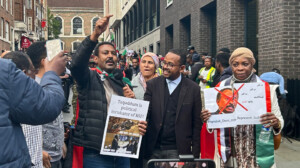Death toll of South Darfur attack rises to 56
Fallata leaders reported yesterday that the death toll of the attack launched by Rizeigat gunmen on El Tawil village in South Darfur on Monday has risen to 56 people. At least 37 were wounded. Ibrahim Mousa, spokesperson the Fallata, said at a press conference in Khartoum yesterday that the attackers used axes and were driving cars and riding horses and camels.
 Fallata leaders report that 56 of their people were killed in South Darfur (Social media)
Fallata leaders report that 56 of their people were killed in South Darfur (Social media)
Fallata leaders reported yesterday that the death toll of the attack launched by Rizeigat gunmen on El Tawil village in South Darfur on Monday has risen to 56 people. At least 37 were wounded.
Ibrahim Mousa, spokesperson for the Fallata tribe, said at a press conference in Khartoum yesterday that the armed attackers, were driving cars and riding horses and camels.
The attack was preceded by large gatherings of Rizeigat fighters who then headed east in the direction of El Tawil village, Mousa said. He criticised the failure of the government forces to intervene, despite the fact that the army garrison is only five kilometres away from where the attack took place.
Mousa expressed his surprise about the heavy weapons used by the attackers. He further noted that paramilitaries of the Rapid Support Forces (RSF) participated in the attack.
He holds the federal government, the South Darfur government, and the RSF responsible for the violence. "The force of 15 vehicles sent to the area is insufficient protection," he stated.
Tensions and violent incidents between Rizeigat and Fallata herders have a long history in South Darfur. The Rizeigat are nomadic Arab herders. In South Darfur, they mainly herd cattle. During the war in Darfur that started in 2003, many young Rizeigat herders were recruited to join the 'Janjaweed militia'. The Fallata are cattle herders as well.
Attacks occurred in the area last month as well. Sudan is planning to send more RSF forces to Darfur to contain the insecurity in the region following the ending of the mandate of the UN-AU Mission in Darfur (UNAMID) on December 31 last year.
Radio Dabanga’s editorial independence means that we can continue to provide factual updates about political developments to Sudanese and international actors, educate people about how to avoid outbreaks of infectious diseases, and provide a window to the world for those in all corners of Sudan. Support Radio Dabanga for as little as €2.50, the equivalent of a cup of coffee.












 and then
and then